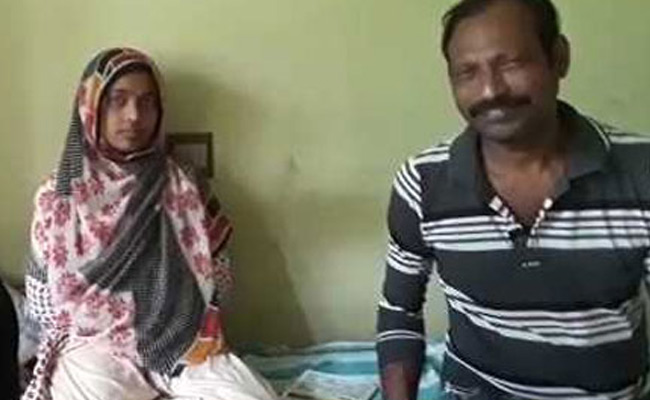‘Love Jihad’ Case: Bring Hadiya Here tells Supreme Court To Father
 NEW DELHI : Hadiya is finally going to be heard – a right that was denied to her by her parents, her community and even the highest court in her home state of Kerala. Supreme Court on Monday said that consent of an adult for marriage is prime – a verdict that women’s rights activists have been waiting for. The top court also directed the police in the southern state to present Hadiya in the court in New Delhi on November 27.
NEW DELHI : Hadiya is finally going to be heard – a right that was denied to her by her parents, her community and even the highest court in her home state of Kerala. Supreme Court on Monday said that consent of an adult for marriage is prime – a verdict that women’s rights activists have been waiting for. The top court also directed the police in the southern state to present Hadiya in the court in New Delhi on November 27.
Hadiya is 24 years old, her consent as an adult is “prime” and her version of how and why she married a Muslim man in Kerala last year will be heard on November 27, the Supreme Court said today as it examined the landmark “love jihad” case that has become the subject of an investigation by the country’s top counter-terror agency.Her testimony next month will be made in open court, judges said today, which means the hearing can be attended by the public.
Akhila Ashokan took the name Hadiya after converting to Islam, married a Muslim man she met on an Islamist matrimonial site, and was then taken to court by her father, who alleged that the marriage was a form of recruitment by ISIS that is gaining currency in Kerala.
“I think the Supreme Court’s observations saying they want to find out what Hadiya thinks is a welcome order. She is an adult woman, she has to be treated as such,” said Vrinda Grover, Supreme Court lawyer and women’s rights activist. Akhila Ashokan, now known as Hadiya, had adopted the Islamic faith and married a Muslim man Shafin Jahan in December 2016.
She had been confined to her father’s house in Kottayam since May, when the Kerala High Court annulled her marriage. Her father, KM Ashokan, angered by his daughter’s decision, had petitioned the Kerala High Court, alleging that his daughter had been forcibly converted and was being held against her will. “When an adult woman, even if she marries a convicted terrorist, that is her right.
The Kerala High Court’s annulment of her marriage is wholly without jurisdiction. She should not be confined in this manner, only a criminal can be,” Supreme Court lawyer Karuna Nundy told Al Jazeera. On August 16, the Supreme Court had ordered a probe by the country’s “anti-terror” agency into whether the marriage was part of a “Love Jihad” conspiracy or whether the woman converted to Islam of her own free will. “I am concerned that with the next date of hearing a month away, she will have to suffer and live with her parents against her wishes,” Grover said.
‘Love Jihad’ myth
Far-right Hindu groups allege that “Love Jihad” is a conspiracy by Muslim groups to lure Hindu women into marriages with Muslim men and to convert them to Islam. The court was hearing a petition by Hadiya’s husband, Jahan, which said the high court order was an “insult to the independence of the women of India as it completely takes away their right to think for themselves”.
India’s top probe body, the National Investigative Agency (NIA) are looking into Jahan’s allegedly “radical” views and his suspected links to banned Islamic groups.”The Hadiya case is fast emerging as one case I have been watching with growing discomfort and anger,” said activist Harnidh Kaur.She said that the case paints an entire minority community as “aggressors and manipulators”, referring to allegations of “Love Jihad”.”To even assume there’s some sort of ‘Love Jihad’ is atrocious, and to think that the SC continues this charade of paying heed to the idea is extremely disheartening.” The top court’s observations on Monday however, provided some succour to Jahan.
Activist Rahul Easwar released a video last week that showed Hadiya pleading for her freedom and stating that her life is under threat at her father’s house. “You have to get me out fast. I am sure I will be killed tomorrow or day after. My father is getting angry, I know. When I walk, he is pushing and kicking me,” Hadiya says in the video. Women’s rights groups, including the Kerala Women’s Commission, have asked for a police probe into Hadiya’s present living conditions.
In May, the Kerala High Court annulled Hadiya’s marriage and ordered her to return to live with her parents in the Kottayam district. Her husband, Shafin Jehan, has appealed against the annulment as well as the sanction given in August by the Supreme Court to the National Investigating Agency to determine if his marriage is part of an emerging pattern which sees vulnerable Hindu women being lured by Muslim men who are agents of terrorist groups including ISIS.
“Get me out of here. Today or tomorrow, I am going to die. I am sure about this. My father is getting angry, I can make out. He pushes me,” Hadiya said in a video released last week by an activist who met her family and her in August.(With Agency Inputs ).

